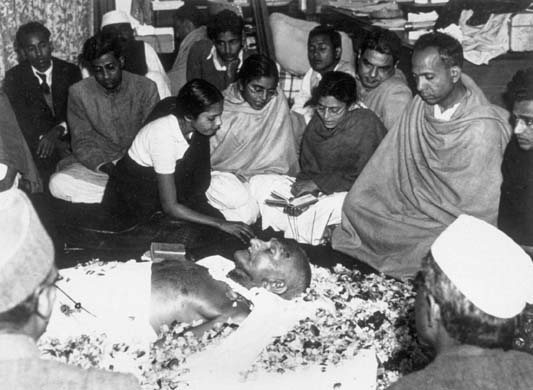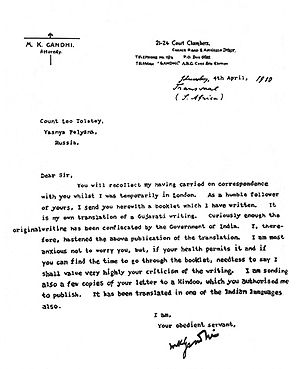NIRODBARAN: I went to Dilip today. He asked me if it was true that you had said that the spirit of your Tapasya is behind the Hindu Sabha movement.
SRI AUROBINDO: What did you say?
NIRODBARAN: I said that I didn't know. It came out in the paper under the name of the secretary, so it may be true.
SRI AUROBINDO: Who said that?
NIRODBARAN: Since it was the secretary, it may be Nolini.
PURANI: No, Anilbaran, I think. Perhaps it was written privately to somebody and they have published it.
SRI AUROBINDO (after some time): Who knows, the spirit of my Tapasya may be behind the Khaksar movement also. The Divine Force is everywhere
*************************************************************************************
SRI AUROBINDO: The Sunday Express says that the Khaksar movement was being fed from Germany.
PURANI: It is quite true. That came out in the secret police investigation. That is why the Indian Government came down on them and Sikandar Hyat could not protect them any more.
NIRODBARAN: Hitler has duped them with Muslim Raj?
SRI AUROBINDO: No, maybe independence of India. This Mushriki has been to England?
*************************************************************************************
NIRODBARAN (addressing Purani): Jinnah has come out. So he is not ill.
SRI AUROBINDO: He practically says to the Government, "You side with us and we will see."
PURANI: What can the Congress do?
SRI AUROBINDO: Yes.
NIRODBARAN: If the Government concedes to the Congress, can the Muslim League do anything effective against it?
SATYENDRA: What can they do?
NIRODBARAN: Non-violent non-cooperation?
PURANI: Non-violent? By the Muslims?
SRI AUROBINDO: They can start some Khaksar agitation.
*************************************************************************************
PURANI : Have you read the report of the officers in the Khaksar shooting enquiry? They have made some amazing disclosures — that Allama Mushriqui intended to enlist twenty-five lakhs of volunteers and be a dictator.
SRI AUROBINDO: Twenty-five lakhs! That means all the Muslim adults.
PURANI: After this, Sikander will hesitate to lift the ban - especially after Sir Chimanlal's accusation that he was also a party to the Pakistan scheme.
SRI AUROBINDO: But, in the scheme, if the Sikhs and Hindus were separated, they would have poor success. They may try to bring in Afghanistan. But Afghanistan is not wealthy and its people have a certain contempt for Indian Muslims. And in Bengal the West Bengalis will want a separate province.
 THE KHAKSAR MOVEMENT
THE KHAKSAR MOVEMENTThe Khaksar Tehrik (
Urdu: تحریکِ خاکسار ) was a
social movement based in
Lahore,
British India, established by
Allama Mashriqi in 1930 to free
India from foreign rule, to uplift the masses, and to revive the
Muslims, who had previously ruled parts of India at different times during a period spanning nearly a thousand years. Although Mashriqi firmly believed that the right to rule India belonged to the Muslims, at the same time, he wanted to create an environment of fairness, justice, and equal rights for non-Muslims as well. For this reason, non-Muslims were allowed to join the Tahrik keeping it free from prejudice against any person, regardless of his/her caste, color, creed. The word "Khaksar" is derived from the Persian language, Khak means dust, and Sar means life, roughly translated as "a humble person."
The Khaksar Tehrik worked under a charter that everyone was required to follow, with no exceptions. The charter was created to ensure all were treated fairly; even Allama Mashriqi, founder and leader of the Tehrik, was held accountable for his actions. The Tehrik was also kept free of any membership fee. All Khaksars were required to bear their own expenses and donate their time. The purpose was to develop the spirit of self-reliance and encourag the Khaksars to spend their own money and time for the national cause...
READ+ ALLAMA MASHRIQI
ALLAMA MASHRIQI
Mashriqi was a noted intellectual who became a college Principal at the age of 25, and then became an Under Secretary, at the age of 29, in the Education Department of the Government of India. He wrote an
exegesis of the
Qur'an which was nominated for the 1925
Nobel Prize. He was offered an
Ambassadorship to
Afghanistan at age 32 and
Knighthood at the age of 33 years, but he declined all
honours.
He subsequently resigned government service and in 1930 founded the
Khaksar Movement, aiming to advance the condition of the masses irrespective of any
faith,
sect, or
religion.
[1] As its leader, he was imprisoned several times. Through his philosophical writings, he asserted that the
Science of Religions was essentially the science of collective evolution of mankind...Mashriqi had a passion for mathematics from his childhood.
[1] He completed his Master's degree in Mathematics from the
University of the Punjab at the age of 19 and broke all previous records. In October 1907 he went to
Britain and matriculated at
Christ's College, Cambridge, to read for the mathematics
tripos. He was awarded a college foundation scholarship in May 1908.
[4] In June 1909 he was awarded
first class honours in Mathematics Part I, being placed joint 27th out of 31 on the list of
wranglers.
[5] For the next two years, he read for the
oriental languages tripos in parallel to the natural sciences tripos, gaining first class honours in the former and third class in the latter.
[6][7]After three years' residence at
Cambridge he had qualified for his
Bachelor of Arts degree, which he took in 1910. In 1912 he completed a fourth tripos in mechanical sciences, and was placed in the second class.
[8] He left Cambridge and returned to India in December 1912.
[9]. During his stay in Cambridge his religious and scientific conviction was inspired by the works and concepts of the professor
Sir James Jeans..
READ MORE





















